Just bring home a new puppy? Congratulations! There are few things more exciting than introducing a new four-footer to your family.
However, as you probably already know, you’re going to have to teach your new pooch the rules about pooping and peeing. Specifically, you want to teach him that he should only relieve himself outside (or, if you prefer, on puppy pads).
Don’t worry — it’s not that hard to do in many cases. We’ll explain everything you need to know below!
When to House Train a Puppy
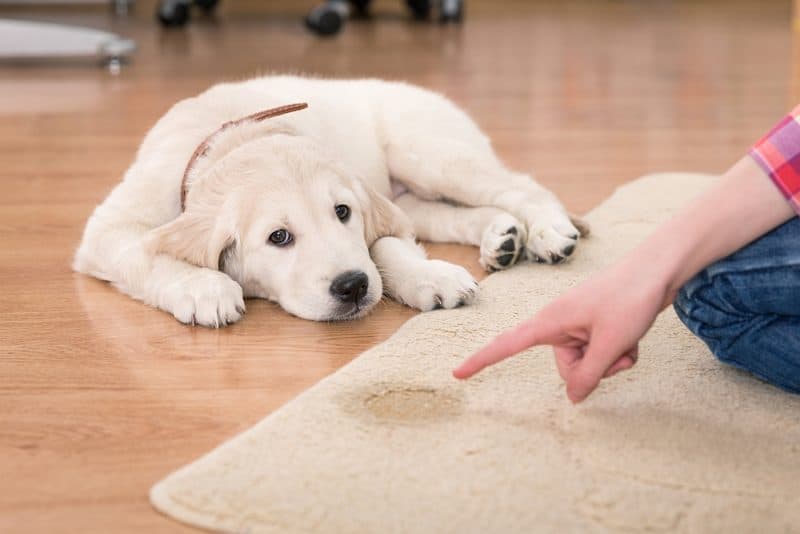
You’ll typically want to begin house training your puppy when he is between 12 weeks and 16 weeks old, although many start earlier. At that point, the puppy has enough control of his bladder and bowels to learn to hold it.
Beware that starting puppy housetraining too soon, and you could be setting up your puppy for failure, as he won’t be old enough to control his bladder.
How Long Does It Take to House Train A Puppy?
The length of time it will take to housetrain a puppy depends on your dog’s aptitude for understanding and his general personality.
Most puppies can be house trained within 4 to 6 months, however some puppies will not be fully reliably house broken until 8 to 12 months.
Keep Puppy In A Defined Space
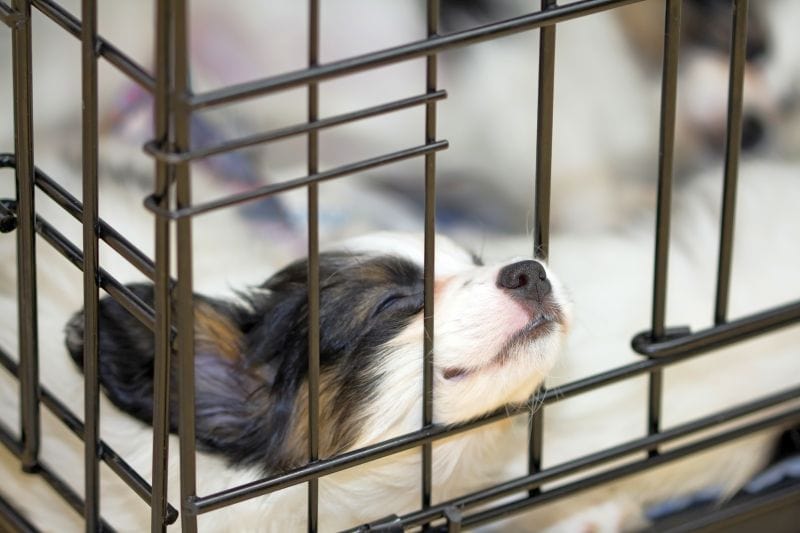
It’s usually easier to house train your pooch if you confine your puppy to a defined space, whether that means in a dog crate for puppies, in an x-pen, in a room, or on a leash.
As your puppy learns that he needs to go outside to do his business, you can gradually give the puppy more freedom to roam about the house.
Depending on the expected full adult size of your puppy, you may want to get a larger crate with inserts that can divide up a large crate into smaller quarters. Sliding dividers mean that you can slowly add in space as your pup grows or gets the hand of potty training.
When Housetraining A Puppy, Act Quickly!
When housebreaking a puppy, you’ll want to watch for patterns in your puppy’s digestive track.
Puppy digestive tracks are extremely efficient and fast. Five to 30 minutes after your puppy eats, he will want to defecate. Be consistent with your puppy’s eating schedule and watch the time so that you can regularly give your puppy outside time after meals, thereby increasing your chances of success.
Housetraining A Puppy: A Safe Space to Pee
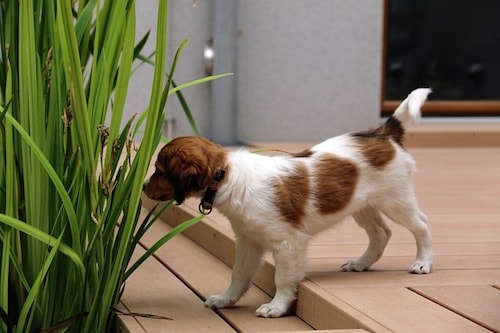
Make sure that your puppy has a place to relieve himself where he feels safe. The spot should be familiar and comfortable to your puppy.
You may have noticed that dogs will often relieve themselves in the very same spot that they’ve used before. Their scent acts like a trigger, and they’ll likely continue using familiar spots to relieve themselves.
It’s also important to keep in mind that your puppy will react to your tones and gestures. A nervous or frustrated tone can easily affect your puppy (but being too squeaky or loud could distract your puppy as well).
Instead, it’s best to keep relatively quiet during while your puppy is learning to do his business.
House Training A Puppy: The Importance of Routine
Having some sort of routine while housetraining your puppy is extremely important.
Sticking to a schedule teaches your puppy that there are times to eat, times to play, and times to potty.
Generally speaking, your puppy can generally control his bladder one hour for every month of age. So if your puppy is two months old, he can hold it for about two hours. Don’t go longer than this between bathroom breaks, or he’s likely to have an accident.
With this in mind, taking your puppy out as frequently as possible is important. Start off taking your puppy outside at least once every two hours. In addition, there are certain times of day when your dog should absolutely be taken outside to potty right away.
These times include immediately after waking up, during and after playing, and after eating or drinking.
You may also want to consider teaching your pup to hit a doggie doorbell when you go outside, which will eventually teach your dog to signal when they need to use the bathroom.
It may be a lot to start with when you’re still getting the potty training basics down, but eventually, it can be quite handy!
Pick a bathroom spot outside, and always take your puppy (on a leash) to that spot. While your puppy is “going,” use a word or phrase, like “go potty,” that you can eventually use before he goes outside to remind him what to do and get your pup to potty more quickly.
Depending on their age, puppies usually need to be fed three or four times a day. Feeding your puppy at the same times each day will make it more likely that he will potty at consistent times as well, and that makes house-training easier for both of you.
Rewarding Your Puppy When Housebreaking
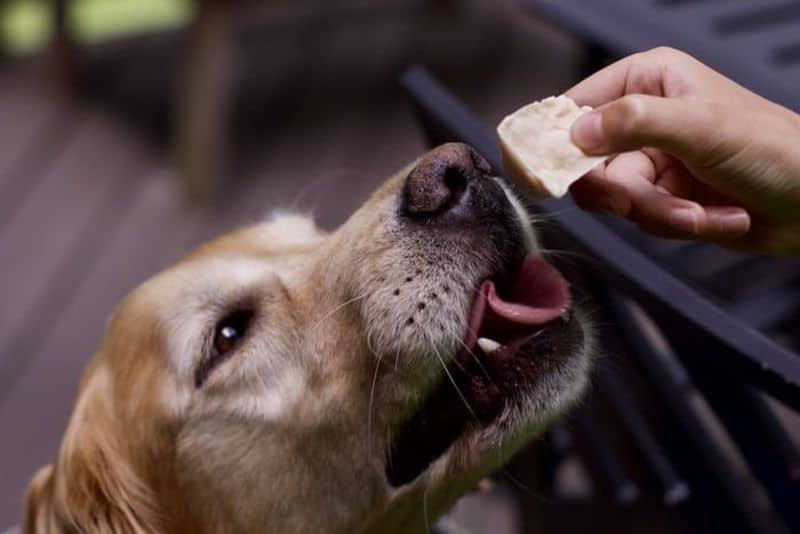
Once your puppy has successfully gone outside, it is important to reward the good behavior.
It doesn’t have to be a parade with 57 trombones, but an enthusiastic word of praise alongside a treat can get the message across of a job well done.
At the same time, don’t punish your puppy for an accident or do anything to create a negative association with the puppy’s bodily functions.
It may be frustrating when your dog pees in the house after just being outside, but you’ll be better off rewarding success rather than punishing mistakes.
If your puppy has an accident, stay calm and assertive and quietly remove the puppy to the place where you want him to go. Expect your puppy to have a few accidents in the house — it’s a normal part of housetraining!
Common Problems When Housetraining A Puppy
Accidents are common in puppies up to 1 year of age. The reasons for accidents range from incomplete house training to a change in the puppy’s environment.
When your puppy does have an accident, keep on training. Then if it still doesn’t seem to be working, consult a veterinarian to rule out a medical issue.
House size can also play a factor. The bigger your house, the more difficult it will be to house train your doggo.
To a puppy, a large home is an endless maze of potty places (it’s a lot to handle!). That’s why it’s often best to start your pup off in a small, enclosed area (like a crate), and slowly add more space as your pooch learns how to potty appropriately.
Another issue can be too much fiber in your puppy’s food, making your puppy more accident-prone.
Too much water intake, and even medications can also result in accidents that your puppy has little control over. If you’re having puppy housebreaking issues, be sure to check all these potential problems.
Tips and Tricks for House Training A Puppy
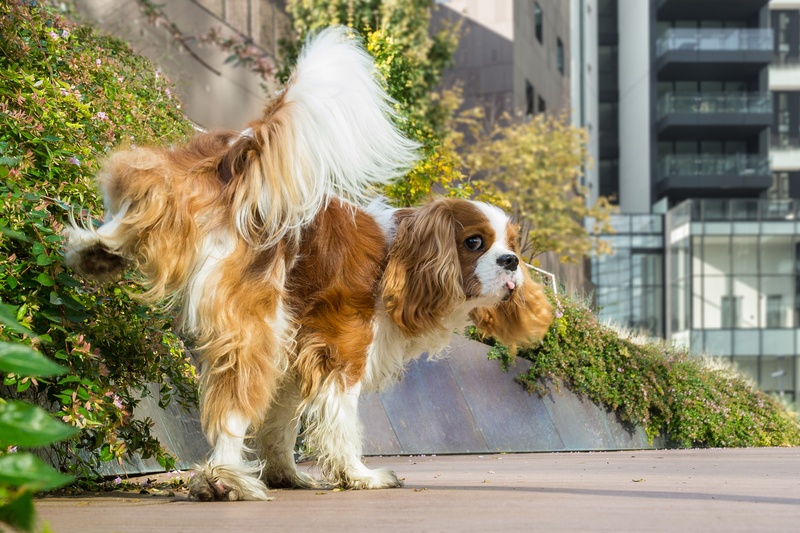
Still having trouble house-training your new pooch? Check out some of these helpful tips!
1. Don’t punish your puppy during housetraining.
Punishing your puppy for having an accident is strongly discouraged. It teaches your puppy to fear you (positive association is a common theme for general dog training across the board).
If you catch your puppy in the act, clap loudly so it knows it has done something unacceptable. Then take him outside by calling him or taking him gently by the collar. When he is finished, praise him or give him/ a small treat.
If you find the evidence but didn’t see the act, don’t react angrily by yelling or rubbing his nose in it. Puppies aren’t intellectually capable of connecting your anger with their accident. You’ll just make things harder and more confusing for your puppy.
2. Stay outside for longer than you have been to prevent puppy accidents.
Staying outside longer with your puppy may help to curb accidents. He may need the extra time to explore.
3. Use enzymatic cleaners to eliminate lingering puppy pee odors.
If your dog pees on the carpet or other furniture, clean up accidents with an enzymatic cleanser rather than an ammonia-based cleaner to minimize odors that might attract the puppy back to the same spot. Remember, dogs like to relieve themselves in the same spots where they detect their scent, so try to eliminate your dog’s scent from any unwanted accident spots.
It’s also not a bad idea to get a puppy bed that is designed to be easily washed, since accidents will be frequent at first.
4. Try switching to potty pads if you think that’ll work better.
Some pet owners prefer to use dog potty pads and grass pads to house train their puppies. They are available online and in pet stores.
***
Have any other questions about house-training your puppy? What kinds of problems are you experiencing? Do you have any puppy house training tips to share?
Let’s hear your thoughts and questions in the comments!
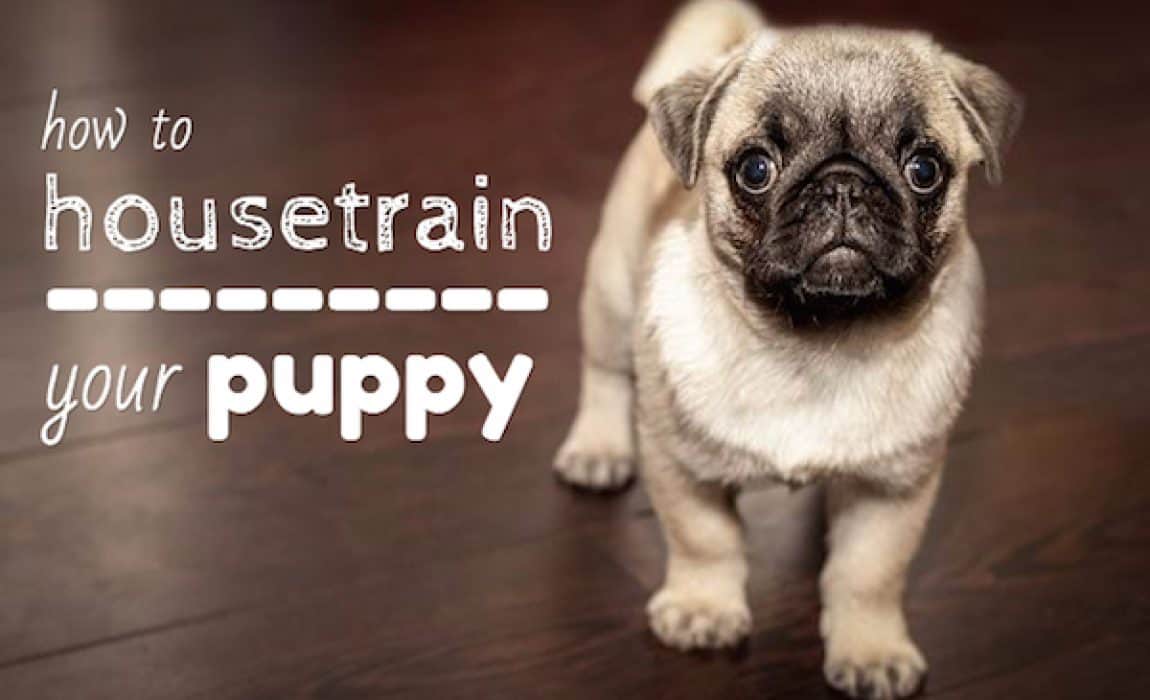
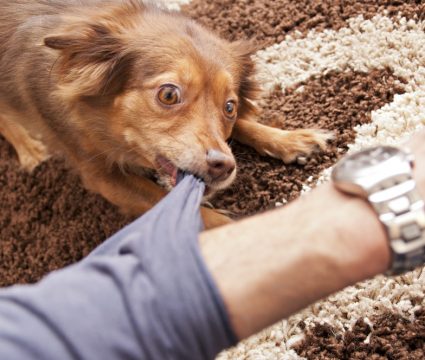



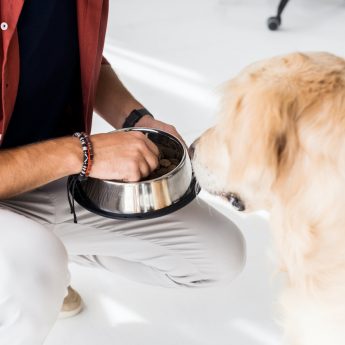
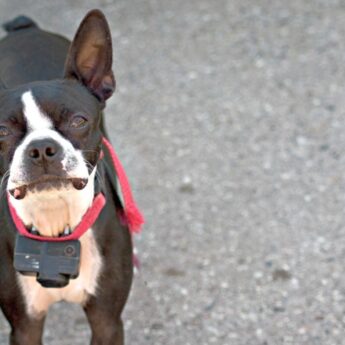
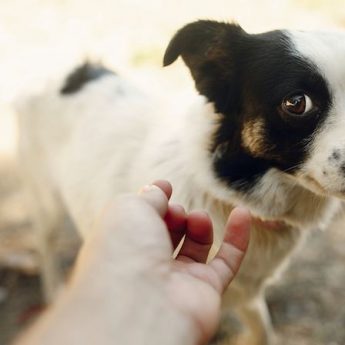
14 Comments
July 19, 2022
My puppy is 3 months old and she is not doing well with her potty training, in the crate or house. At night I take her outside every two hours and in between she still has accidents in her crate. In the house she will go out and potty and come in the house and potty again! Any suggestions?
July 20, 2022
Hey there, Kasey.
For starters, it’d be a good idea to check with your vet and make sure there aren’t any medical problems going on. Additionally, make sure the crate isn’t too big, and that there aren’t any lingering pee odors on the carpet inside — they may be triggering her.
If none of those things help, check out our article about some of the reasons dogs pee in the house after going outside for some tips.
Best of luck!
May 12, 2022
I want to train my dog how to yell out when he needs to pee or popo but I don’t know how please help
May 13, 2022
Hey there, Ann.
While it’s not *exactly* the same thing, we have a great article about teaching your dog to use potty bells.
You could just adjust the training program a bit to get the results you’re after.
Best of luck!
February 28, 2020
My puppy is 4 months old and I can take him out and he will pee and them come back in and pee in 15 to 30 minutes on the floor. I feel we are going backwards. Should I confined him to a cage and try potty training that way.. Need help!
February 29, 2020
Hey, Susan.
House-training puppies can be frustrating! Check out our article on crate training — it may be just the answer for you and your pooch!
Best of luck!
February 29, 2020
Thanks for crate training info. I seem to have peeing problems only in the evening after 5pm or when i’m trying to bake. He does great in the morning. Like tonight. He pee a little so I cleaned that up and after I wash my hands he went again. so I cleaned that up and he went again. I just took him out and he had did both. So I will do the crate in the evening until he comes out of this habit. I’m retired so I.m here all day, I do crate him at night and he does great. Thanks for the help
January 23, 2020
How do l train my puppy in the Winter with very low temps -20 to -30 ,they are 10wks old and are good on the pads right now ,no cage .
January 23, 2020
Hey, Sandra. Just keep using the pads, and then, when warm temperatures return, start teaching them to tinkle outdoors. Or, you could try bundling the little floofs up!
Best of luck!
November 11, 2015
can you trin youre puppy to pads nd go outside
November 11, 2015
Sure!
October 25, 2015
This is a great article! Excellent tips. I am going to try the Enzymatic Cleaners.
October 21, 2015
Great advice and using a crate makes it so much easier! I especially like your idea of associating a command or phrase with going to the bathroom. I did this with Haley and it makes life much easier, especially when you’re traveling and need them to go on command. Fantastic article!! 🙂
October 22, 2015
Thanks Elaine! I completely agree on the phrase trigger – very helpful!